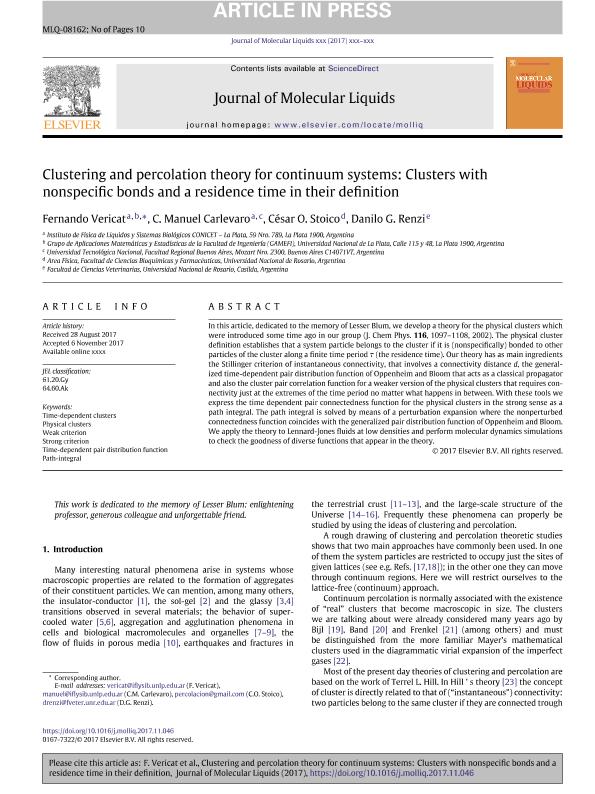Mostrar el registro sencillo del ítem
dc.contributor.author
Vericat, Fernando

dc.contributor.author
Carlevaro, Carlos Manuel

dc.contributor.author
Stoico, César Omar

dc.contributor.author
Renzi, Danilo Germán

dc.date.available
2018-07-05T14:09:19Z
dc.date.issued
2017-11
dc.identifier.citation
Vericat, Fernando; Carlevaro, Carlos Manuel; Stoico, César Omar; Renzi, Danilo Germán; Clustering and percolation theory for continuum systems: Clusters with nonspecific bonds and a residence time in their definition; Elsevier Science; Journal of Molecular Liquids; 270; 11-2017; 128-137
dc.identifier.issn
0167-7322
dc.identifier.uri
http://hdl.handle.net/11336/51303
dc.description.abstract
In this article, dedicated to the memory of Lesser Blum, we develop a theory for the physical clusters which were introduced some time ago in our group (J. Chem Phys. 116, 1097–1108, 2002). The physical cluster definition establishes that a system particle belongs to the cluster if it is (nonspecifically) bonded to other particles of the cluster along a finite time period τ (the residence time). Our theory has as main ingredients the Stillinger criterion of instantaneous connectivity, that involves a connectivity distance d, the generalized time-dependent pair distribution function of Oppenheim and Bloom that acts as a classical propagator and also the cluster pair correlation function for a weaker version of the physical clusters that requires connectivity just at the extremes of the time period no matter what happens in between. With these tools we express the time dependent pair connectedness function for the physical clusters in the strong sense as a path integral. The path integral is solved by means of a perturbation expansion where the nonperturbed connectedness function coincides with the generalized pair distribution function of Oppenheim and Bloom. We apply the theory to Lennard-Jones fluids at low densities and perform molecular dynamics simulations to check the goodness of diverse functions that appear in the theory.
dc.format
application/pdf
dc.language.iso
eng
dc.publisher
Elsevier Science

dc.rights
info:eu-repo/semantics/openAccess
dc.rights.uri
https://creativecommons.org/licenses/by-nc-nd/2.5/ar/
dc.subject
PATH-INTEGRAL
dc.subject
PHYSICAL CLUSTERS
dc.subject
STRONG CRITERION
dc.subject
TIME-DEPENDENT CLUSTERS
dc.subject
TIME-DEPENDENT PAIR DISTRIBUTION FUNCTION
dc.subject
WEAK CRITERION
dc.subject.classification
Astronomía

dc.subject.classification
Ciencias Físicas

dc.subject.classification
CIENCIAS NATURALES Y EXACTAS

dc.title
Clustering and percolation theory for continuum systems: Clusters with nonspecific bonds and a residence time in their definition
dc.type
info:eu-repo/semantics/article
dc.type
info:ar-repo/semantics/artículo
dc.type
info:eu-repo/semantics/publishedVersion
dc.date.updated
2018-06-25T16:16:34Z
dc.journal.volume
270
dc.journal.pagination
128-137
dc.journal.pais
Países Bajos

dc.journal.ciudad
Amsterdam
dc.description.fil
Fil: Vericat, Fernando. Consejo Nacional de Investigaciones Científicas y Técnicas. Centro Científico Tecnológico Conicet - La Plata. Instituto de Física de Líquidos y Sistemas Biológicos. Universidad Nacional de La Plata. Facultad de Ciencias Exactas. Instituto de Física de Líquidos y Sistemas Biológicos; Argentina
dc.description.fil
Fil: Carlevaro, Carlos Manuel. Consejo Nacional de Investigaciones Científicas y Técnicas. Centro Científico Tecnológico Conicet - La Plata. Instituto de Física de Líquidos y Sistemas Biológicos. Universidad Nacional de La Plata. Facultad de Ciencias Exactas. Instituto de Física de Líquidos y Sistemas Biológicos; Argentina. Universidad Tecnológica Nacional. Facultad Regional Buenos Aires; Argentina
dc.description.fil
Fil: Stoico, César Omar. Universidad Nacional de Rosario. Facultad de Ciencias Bioquímicas y Farmacéuticas; Argentina
dc.description.fil
Fil: Renzi, Danilo Germán. Universidad Nacional de Rosario. Facultad de Ciencias Veterinarias; Argentina
dc.journal.title
Journal of Molecular Liquids

dc.relation.alternativeid
info:eu-repo/semantics/altIdentifier/doi/https://dx.doi.org/10.1016/j.molliq.2017.11.046
dc.relation.alternativeid
info:eu-repo/semantics/altIdentifier/url/https://www.sciencedirect.com/science/article/pii/S0167732217339740
Archivos asociados
